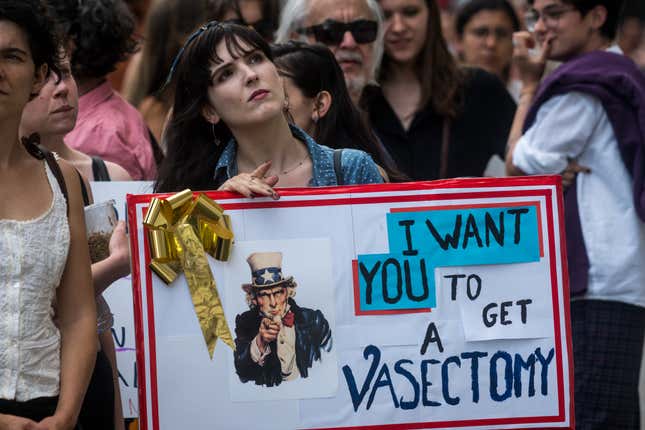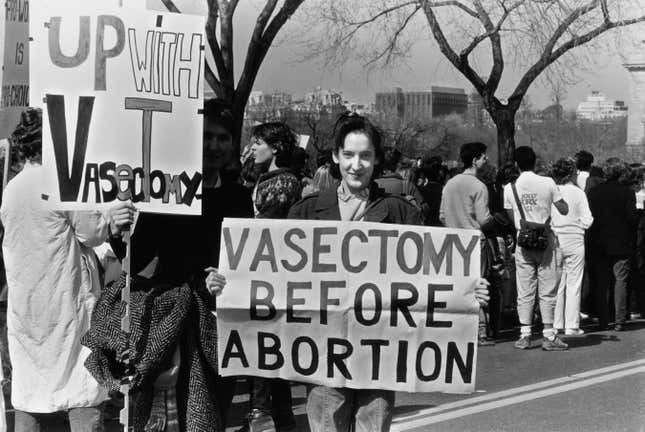
In the wake of news last week that the Supreme Court intends to overturn Roe v. Wade, some cis men began sharing their stories on social media of how the right to abortion has impacted their lives. It was a vitally important reminder that in addition to women, trans and non-binary people, and all pregnant-capable people, cis men have greatly benefited from Roe as well.
So men clearly see what’s at stake for them right now: According to new data Innerbody Research shared with Jezebel, Google searches for “how much is a vasectomy” and “are vasectomies reversible” are up 250% since the Supreme Court leak last week.
Additionally, daily searches including the term “vasectomy” are up 99%, from just 6,033 average searches per day between March 6 and April 2, to 12,000 from May 1 to May 7. Not-so-coincidentally, the states where searches for “vasectomy near me” were most popular were Michigan, Kentucky, Indiana, Ohio, and Florida. Nearly all of these states have pre-Roe abortion bans, “trigger bans” that would automatically ban abortion if Roe no longer applies, or other stringent abortion bans and restrictions already in effect.
Now, it’s been true for years that cis men should shoulder more of the responsibility of pregnancy prevention. Birth control for women and pregnant-capable people has often been expensive, burdensome to access or get covered by insurance, and, for some people, can come with side effects that range from annoying to dangerous.
As for the barriers to abortion access, where do I even begin? Ninety percent of US counties lack an abortion provider, dozens of states have passed over 1,300 abortion restrictions since Roe was decided, and more than 3 million people with uteruses live in “abortion deserts,” or cities where the nearest abortion provider is at least 100 miles away.
Still, this recent spike in searches for vasectomies isn’t necessarily good news, and certainly isn’t a feminist victory. It would be one thing if cis men had long been considering this route—but literally no one should have to make decisions about their bodies and reproductive lives based on political pressures and state reproductive coercion, inflicted by the end of Roe v. Wade. Protest signs, tweets, and even tongue-in-cheek bills telling men to get vasectomies might be plucky and fun, but ultimately, policy-based reproductive coercion from the state will always be dehumanizing and fucked up for people of all genders.

At the very least, it’s clear from the search trends that cis men are starting to realize their reproductive fates are deeply connected to pregnant people’s. We saw a similar trend last December when a doctor at the Austin Urology Institute in Texas said his practice saw “about a 15% increase in scheduled vasectomies” since the state’s near-total abortion ban took effect in September. The doctor told the Washington Post that patients who called him said they were “‘here because some of these changes that [Texas Gov. Greg] Abbott and our legislature have passed are really impacting our decision-making in terms of family planning,’” and “for the first time, patients are citing a state law as their motivating factor.”
That “state law” is now impacting cis men’s reproductive decision-making might ultimately be new for them, but it certainly isn’t new for women and pregnant people: I very vividly remember the day Supreme Court Justice Anthony Kennedy announced his retirement because I dropped what I was doing and called my doctor to schedule an appointment for a Nexplanon insertion. And in a similar vein, it’s not just searches for vasectomies that have surged since last week—searches for “tubes tied surgery,” “fallopian tube removal,” “tubal ligation” and “salpingectomy” have also doubled, according to Newsweek. “Female sterilization” was searched most in states like Montana, South Dakota, and Kentucky, while “tubal ligation” was most searched in West Virginia, North Dakota, Kentucky, Arkansas and Oklahoma. Again, based on the abortion laws in these states, that probably isn’t a coincidence.
One telling stat reveals among married men, 13.1% reported having vasectomies compared to 21.1% of married women having tubal sterilizations, despite how, of the two safe, reversible sterilization methods, vasectomies are simpler and have a lower complication rate. It’s also important to consider the long, traumatic history of Black, brown, and Indigenous women and pregnant people being subjected to forced sterilizations across the country, rendering it all the more fucked up that these communities would be disproportionately harmed by the end of Roe, and could face more pressure than ever to undergo sterilization.
The cultural pressures and policies that place sole responsibility for preventing pregnancy on women and pregnant-capable people have always been costly and exhausting. Even at this apocalyptic moment for reproductive freedom, it’s semi-heartening to see cis men finally taking a cue from the end of Roe and stepping up. But it shouldn’t have taken this long—and it also shouldn’t have taken coercion from the government.